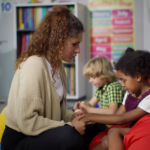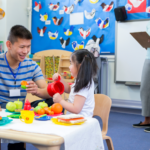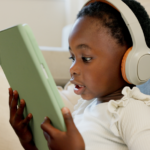
Understanding trauma and supporting staff and students to thrive
This blog post delves into these four topics and provides ready-to-use training and coaching resources to equip all school staff with the knowledge and evidence-based strategies to support students and staff who have experienced trauma ...

Avoiding Implicit Bias in Classroom Observations
Classroom observations are a key tool in educational research and practice, used to evaluate teaching methods, assess student engagement and behavior, and gather data on classroom interactions to inform instructional strategies and policy decisions. However, observations are not immune to implicit biases—or attitudes, behaviors, and actions that are prejudiced in ...

Supporting Students with Behavioral and Emotional Needs: A Conversation with Carl Sumi
In the latest episode of The SRI Homeroom podcast, Senior Principal Education Researcher Carl Sumi joined host Kori Hamilton Biagas to discuss strategies, interventions, and recommendations for educators, schools, and researchers hoping to meet that need head-on ...

Conversations with parents about YouTube: What are kids watching, and what are they learning?
Toddlers and preschoolers today are spending more time watching videos on online streaming services like YouTube than in any other format ...

BEST in CLASS: What Coaches and Teachers Say About It. Part 2: Teacher Perspectives
Practice-based coaching (PBC) promotes a strong collaborative partnership between teachers and coaches to facilitate the use of effective instructional practices. The PBC process includes skills instruction on BEST in CLASS practices, shared goals and action planning, implementation support, classroom observation, and reflection and feedback ...

BEST in CLASS: What Coaches and Teachers Say About It. Part 1: Coach Perspectives
BEST in CLASS (Behavioral, Emotional, and Social Training: Competent Learners Achieving School Success) is a tier 2 (targeted) evidence-based intervention for young children with persistent and intensive challenging behaviors ...

Handle With Care: Expanding and evaluating trauma supports for students
Now more than ever, many children and youth are exposed to potentially traumatic events, whether it be from community or school violence, natural disasters, or the sudden loss of a loved one ...

Which Kindergarteners are at Risk of Being Bullied and/or Becoming Bullies, and What Can Educators and Parents Do About It?
Bullying occurs when children experience unwanted and aggressive behavior from more powerful peers repeatedly over time ...

Supporting Youth in a Social Media Boom
The popularity of social media is widespread and continues to rise, especially among youth. According to a recent general advisory report released by the Office of the U.S. Surgeon General, up to 95% of youth aged 13-17 regularly use at least one social media platform ...

Top 5 Myths About SEL and Exclusionary Discipline
CASEL defines social-emotional learning (SEL) as “…the process through which young people and adults acquire and apply the knowledge, skills, and attitudes that help us to understand ourselves, connect with others, achieve our goals and support our communities” ...

Promises and Pitfalls of PBIS Part 3: Strategies for educators to reduce implicit bias when responding to challenging behaviors
We highlight strategies educators can use to reduce implicit bias when responding to challenging behaviors, which is one of the five key components to reduce disproportionality in school discipline when implementing a PBIS approach ...

5 Things that Everyone in Schools Should Know about Suicide Prevention (5 cosas que todos en las escuelas deberían saber acerca de la prevención del suicidio)
With the emergence of the COVID-19 pandemic, we have seen a significant increase in symptoms of mental health problems among school-aged youth. Most notably, the percentage of children with symptoms of depression and anxiety has become much larger ...

Why Participate in Research with SRI?
Since 2019, we’ve not only engaged with educators, community members, and mental health service providers to co-author blogs about their challenges and accomplishments on the ground, but we also compiled helpful resources from our colleagues to promote collective work in the field and across the country ...

How empowered do multilingual students with disabilities feel to make their own choices?
In a recent descriptive study of high school students who are multilingual learners (MLs) with disabilities, SRI researchers found that these students attribute fewer self-determination behaviors to themselves than MLs without disabilities or students who are not MLs ...

Promises and Pitfalls of PBIS Part 2: Engaging Students and Families in Equity-Focused PBIS
In this second post in this series, we will discuss how to elevate the voices of students and families – one aspect of implementing a positive behavior framework that is preventive, multi-tiered, and culturally responsive ...

Promises and pitfalls of PBIS Part 1: Importance of an equity-centered approach
Students who are Black, Latinx, and Native American are more likely than White students to be suspended or expelled – even when comparing consequences for the same infractions ...

Practice-Based Coaching on the Pyramid Model: “It builds you up and finds your strengths”
SRI Education researchers are conducting an evaluation of the Pyramid Model, a three-tiered framework that supports early childhood education (ECE) teachers in preschool classrooms. The main goals of the Pyramid Model are to support ECE teachers as key figures in promoting the social-emotional skills and competence of children with and ...

How can teachers build and enhance their students’ social-emotional skills?
One intervention, BEST in CLASS (Behavioral, Emotional, and Social Training: Competent Learners Achieving School Success), was specially designed to address young children’s persistent and intensive challenging behaviors ...

Missing the mark or moving the needle? Reflections on how to center equity in research
Issues of race are deeply ingrained in every facet of our history and society. As researchers, we strive to promote children’s development and opportunities to succeed both in and out of school, but our work is not immune from a legacy of racism ...

What a long, strange trip it’s been
Going back to the classroom this year will be tough. That’s why we're focusing on bringing you resources to help with recovery from all sorts of trauma ...

Reflecting on a year of distance learning as teachers plan for school reopening
After over a full year of school closures, several teachers and school administrators are busy preparing for the long-awaited return to in-person classes this fall. But while worries of student learning-loss, momentum, and social-emotional well-being remain at the forefront of parent and school administrators’ concerns, the significant impact that this ...

Free professional development opportunity: how to support students and educators dealing with trauma
Join us and REL Appalachia on August 16-17, 11:00am – 4:00pm EDT. Between the ongoing opioid crisis and all of the ways that the COVID-19 pandemic has impacted students and families, educators’ number one learning need for the 2021-2022 school year is supporting students experiencing trauma ...

Social-Emotional Learning Program Study: Tools for Getting Along
After a turbulent 2020-2021 school year, it is more important than ever that educators have feasible and effective options to support students’ foundational social-emotional skills. Prior studies have found that students who participate in social-emotional learning (SEL) programs improve their behavioral and academic functioning and reduce their challenging behaviors.1 When ...

How a researcher learns from practice
We know that research informs practice in education, but how does practice inform research? Dr. Michelle Woodbridge, one of our lead researchers, recently attended a webinar on supporting students impacted by racial stress and trauma. In our latest blog post, she shares her response to that learning experience (spoiler alert ...

How early childhood education providers can use COVID-19 relief funds to establish lasting mental health supports for staff and children
Did you know? The recent influx of federal COVID-19 relief funds provides an opportunity to fund early childhood educational mental health supports and services! State agency leaders and early childhood educators can use infant and early childhood mental health consultation (IECMHC) to meet children’s social and emotional needs during and ...
